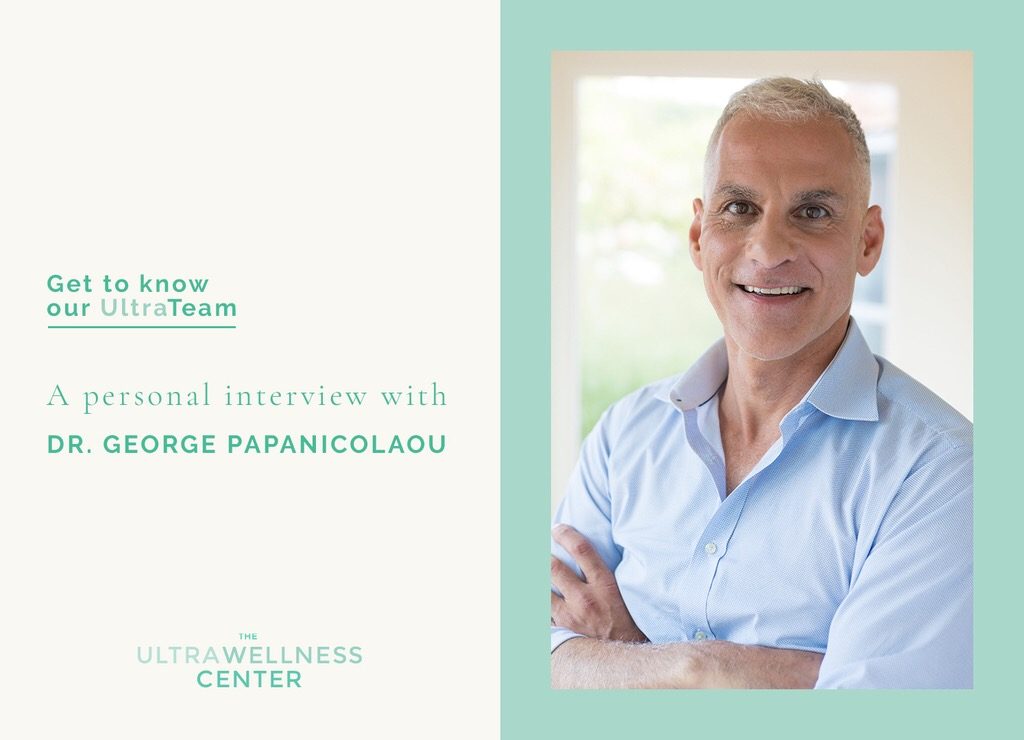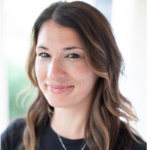Getting to Know Our UltraTeam: A Personal Interview With Dr. George Papanicolaou

What sparked your initial desire to pursue and practice Functional Medicine?
When I was practicing conventional medicine, the emphasis was on treating the disease, not the whole person. The market forces of the health care system pushed me to see more patients in less time, which left me just enough time to name the disease and write a prescription. Being a prescription vending machine is not how I am wired, nor what I understood would lead to optimal health and a fulfilled life for my patients. They seemed to know this too. More often than not they bemoaned the number of pills they took and saw them as symptomatic of being sick, not healthy. Yet at the same time, they were convinced that there was a “silver bullet” cure to most of their health problems, because that was what the commercials led them to believe.
In osteopathic medical school, I was taught that the person is a unit of body, mind and spirit, capable of self-regulation, self-healing and balanced health. Any rational treatment must be based on understanding the complex interrelationship between structure and function.
When you get right down to it, whether a patient is relatively sick or relatively healthy never depends on, just one miracle drug, procedure, supplement, diet, or lack thereof—our bodies are a slow accumulation of the interactions between environment, intake, genetics, and habits—and health takes time. As a doctor, I wanted to give my patients that time.
I was attracted to Functional Medicine because of its roots in systems biology and its rational paradigm for working through the complex matrix of mind, body and spirit. It stands in stark relief to the reductionist model of conventional medicine which looks at parts isolated from their context in the whole. And just as it makes room for the whole patient, Functional Medicine makes room for the whole doctor—body, mind, and spirit—to be fully present.
Dr. Abraham Verghese said, “There are a few things that are timeless in medicine, unchanged since antiquity, which we can keep front and center as we bring about reform. One is the simple truth that patients want us to be more present. We as physicians want to be more present with the patient, as well, because without that contact, our professional life loses much of its meaning.
It is a one-word rallying cry for patients and physicians, the common ground we share, the one thing we should not compromise, the starting place to begin reform, the single word to put on the placard as we rally for the cause.
Presence. Period.”
Being present opens infinite possibilities for doctor and patient to work together to address the impact of genetics, environment, trauma, infection, toxins, nutrition and lifestyle in such a way that creates the conditions for optimal health.
How would you define living an UltraLife?
I define an Ultra Life as one marked by contentment. A life in which—in any and all situations—I can be satisfied that I am where God wants me to be, with a purpose and plan, even though it may not always be clear. Life is the joy of one’s greatest achievement and the despair in the face of significant losses, but in the Ultra Life, peace that transcends all understanding keeps one on course. A person living an Ultra Life is marked by an ability to be humble and generous in both victory and defeat— to express kindness, love and mercy to both friend and enemy. It is a rare spiritual transcendence that marks an Ultra Life.
What is your morning routine?
- Wake up 5am
- I rollover in bed and hug my wife and welcome her to the morning.
- Head to kitchen for coffee blended with MCT oil.
- Greet Leo and Belle (golden retrievers) with morning belly rubs, let them out and eventually feed them.
- I have a quiet time that includes reading a bible devotional and prayer/meditation. My wife and I often share this time together.
- Journal – it is the core of my routine.
- Review my daily calendar and write in any additional tasks.
- Depending on the day I will exercise: cycling indoor, resistance training, run or play basketball.
- No breakfast – I will fast until somewhere between 10am and 12 pm.
Favorites + Firsts:
Favorite movie? Lord of the Rings Trilogy
First concert? Keith Jarrett -1978 Philadelphia
Favorite Indulgence? Blueberry pie with whipped cream
Favorite way to relax? Enjoying physical intimacy with my wife
Favorite Podcast? I listen to books more than Podcasts but when I do TedTalks and Doctors Farmacy
What is the most rewarding aspect of your position at UWC?
The clinical staff is constantly engaged in learning. We meet for clinical rounds once weekly to go over cases and/or listen to guest doctors or scientists present the latest advances in diagnosis and treatment. That sounds mundane but it is not. The energy and passion of the team is inimitable. This culture is matched by an unparalleled level of commitment to creating an amazing delivery system for Functional Medicine that puts the patient in the center of care.
Tell us about your most rewarding case study:
Trudy, at age 54, was diabetic, obese, menopausal, struggling with sleep, and was tired all the time. Trudy had recently lost a close friend for whom she was the primary caretaker in her friend’s final years of life. Trudy was at a low point. Her main goal was to lose weight and get her diabetes under control without using medications. In our initial consultations we looked at food sensitivities, leaky gut, hormone imbalance and adrenal fatigue. But we agreed that before addressing any of the above, her stress—likely the worst toxin of all—needed to be lowered. She was a thoughtful woman with a deep faith. The first step in her healing was to help her establish a routine of prayer and meditation. She also needed to establish a network of support. After taking three to four months to re-establish some trusted relationships and start practicing her spiritual habits, Trudy was ready to tackle her treatment plan. Her plan started with a 30-day detox diet, probiotics and gut healing botanicals. After that, she transitioned to a modified ketogenic diet. She was still feeling tired and sleep was still an issue. I got her to commit to daily walks, and started her on adrenal adaptogens to help with menopausal symptoms. Over the next few months, the combined lifestyle changes began to work their magic. In eight months flat, she had lost 60 pounds and had her blood sugars in goal range without medication. Most importantly, her energy and enthusiasm for life had returned. As life would have it (and as life so often does have it), just as she was getting her joy back, Trudy was approached by a local college to establish an international mentorship and spiritual development program for students. It was a dream job for her, and now she was up for the challenge!
Your biggest goal for 2019?
Writing. It is something I have always enjoyed but it never became a habit. I am working with a writing coach so that my writing comes with ease and elegance. My goal is to consistently journal and blog about medicine and life.
If you had to choose one life mantra that consistently strikes a chord with you, what would it be?
Goodness, peace, love, joy.

